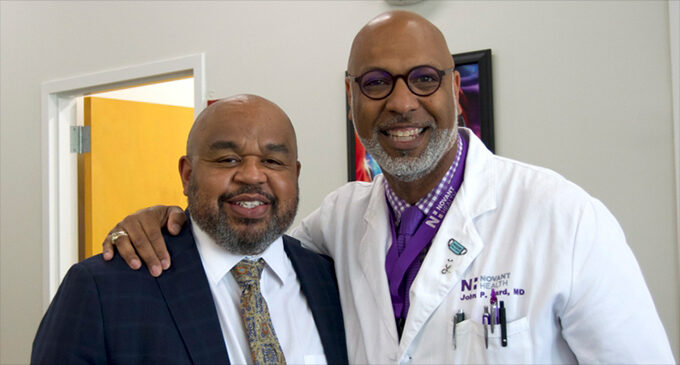Putting off that routine checkup? This patient says waiting almost cost him his life.
Fred Adams with Dr. John Card.

By Patrick Flanary
Twelve years ago, Fred Adams was stretched thin. At 36, parenting and running his own law practice in Winston-Salem left little time for much else. As a result, Adams skipped exercise, ate what he wanted and lost count of the routine checkups he’d been putting off. It took a medical emergency for him to finally change course.
Adams was experiencing terrible headaches and nausea, but figured the discomfort would eventually subside. But his wife, April, wasn’t about to wait any longer. When she urged Adams to go in for tests, scans revealed that he had suffered a stroke without ever knowing it.
“I was scared to death,” remembered Adams, 48, who today serves as a judge. “I didn’t have the typical symptoms – no slurred speech, no loss of movement. But I had been doing everything wrong.”
A family history of stroke and diabetes had contributed to Adams’s vertebral artery dissection (a tear in an artery in the neck), a common stroke cause in people younger than 45. High blood pressure, obesity and neglecting exercise are also among the factors that can cause strokes. They affect about 800,000 people in the U.S. each year, with African Americans almost twice as likely as white patients to have a first stroke, according to the National Institutes of Health.
For most men, the excuses mount with age: a growing family, a hectic career, a distrust of medicine. But putting health last by delaying routine health checkups and screenings can often lead to a shorter life. Men of color are especially reluctant to book medical appointments, said Dr. John Card, Adams’s primary care physician at Novant Health Adult Primary Care Harper Hill.
“We sometimes fight an uphill battle when it comes to prescribing medication to our African American patients,” Card said. “It’s a feeling of not wanting to feel inferior. Whenever we’re ailing or told that something’s wrong with us, we feel we’re not that super-person we believe ourselves to be.”
Given Adams’s family history, Card prescribed medication and an exercise regimen, and referred him to a nutritionist. “Everything was bad,” Adams said. “High blood pressure, high cholesterol. I wasn’t working out or doing anything on a regular basis, except drinking way too much juice,” which can be extremely high in sugar.
Medical screenings exist because many conditions in middle age – undiagnosed high blood pressure and prediabetes, for instance – don’t always show up in an obvious way.
“Our goal is not to find something wrong with you,” Card said. “Our goal is to help keep you healthy. But it’s important to come in for your yearly checkups and necessary follow-ups to maintain your health. If we don’t try to prevent illnesses from happening, then by the time you feel it, it can be too late.”
Over the course of 12 years, Adams has shed his reluctance thanks to his relationship with Card.
“Dr. Card has genuinely wanted to get me in a better place health-wise,” Adams said. “He’s very thorough and leaves no stone unturned. I trust his personality and his demeanor.”
Today, Adams is busier than he’s ever been. In 2021 he was appointed a district court judge in Forsyth County. But his health no longer takes a backseat. Consistent medication, regular walks and a close eye on his dinner plate constitute Adams’s daily discipline. And he never misses a checkup.
“Every time I see Dr. Card, I thank him for saving my life,” Adams said. “I was headed in the wrong direction completely. And if I had not made those changes, I can’t say that I would still be here.”









